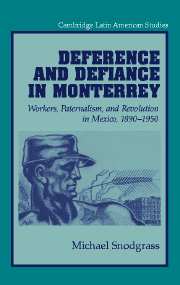Book contents
- Frontmatter
- Contents
- Acknowledgments
- Introduction
- 1 Porfirian Progress in “Mexico's Chicago”
- 2 Revolution Comes to Monterrey
- 3 Work, Gender, and Paternalism at the Cuauhtémoc Brewery
- 4 Making Steel and Forging Men at the Fundidora
- 5 The Democratic Principles of Our Revolution: Labor Movements and Labor Law in the 1920s
- 6 Every Class Has Its Leaders: ASARCO, The Great Depression, and Popular Protest in Monterrey
- 7 Stay with the Company or Go with the Reds
- 8 State Your Position!: Conservatives, Communists, and Cardenismo
- 9 The Quotas of Power: Organized Labor and the Politics of Consensus
- 10 The Persistence of Paternalism
- 11 The Institutionalized Revolution
- Select Bibliography of Primary Sources
- Index
7 - Stay with the Company or Go with the Reds
Published online by Cambridge University Press: 19 August 2009
- Frontmatter
- Contents
- Acknowledgments
- Introduction
- 1 Porfirian Progress in “Mexico's Chicago”
- 2 Revolution Comes to Monterrey
- 3 Work, Gender, and Paternalism at the Cuauhtémoc Brewery
- 4 Making Steel and Forging Men at the Fundidora
- 5 The Democratic Principles of Our Revolution: Labor Movements and Labor Law in the 1920s
- 6 Every Class Has Its Leaders: ASARCO, The Great Depression, and Popular Protest in Monterrey
- 7 Stay with the Company or Go with the Reds
- 8 State Your Position!: Conservatives, Communists, and Cardenismo
- 9 The Quotas of Power: Organized Labor and the Politics of Consensus
- 10 The Persistence of Paternalism
- 11 The Institutionalized Revolution
- Select Bibliography of Primary Sources
- Index
Summary
In February 1935, General Lázaro Cárdenas paid his first visit to Monterrey as Mexico's president. Coming just weeks after his inauguration, he passed the brief, twelve-hour stop meeting with the city's most prominent industrialists and labor leaders. The regiomontanos expressed some earnest concerns. Strikes had then reached record levels in their hometown. So had claims filed with the state's labor court system. Local politicians had become increasingly troublesome as well, publicly pledging their support of “red” union activists as they challenged the legality of company unions. The industrialists could, nevertheless, reflect upon the positive. Manufacturing thrived as never before. Moreover, labor disputes remained conspicuously absent at such major industries as steel, brewing, glass, and smelting. The businessmen attributed that to the “sensible” leaders who led the Independent Unions of Nuevo León, the city's federation of company unions. They reminded President Cárdenas that these activists were all blue-collar workers who had been “forged within the factories and workshops of Monterrey.” They therefore claimed to represent “genuine working-class interests,” as opposed to the “false leaders” who used workers to promote their own political ambitions. The industrialists then outlined their paramount concern: the threat posed by Communists to their city's economic prosperity. The president assured them that “communism would not be introduced” to Monterrey.
Cárdenas also met with Pancho Guzmán and Rosendo Ocañas, steel workers speaking on behalf of the Independent Unions. Ocañas reiterated that the white unions were “serious organizations comprised exclusively of working people.”
- Type
- Chapter
- Information
- Deference and Defiance in MonterreyWorkers, Paternalism, and Revolution in Mexico, 1890–1950, pp. 166 - 201Publisher: Cambridge University PressPrint publication year: 2003



